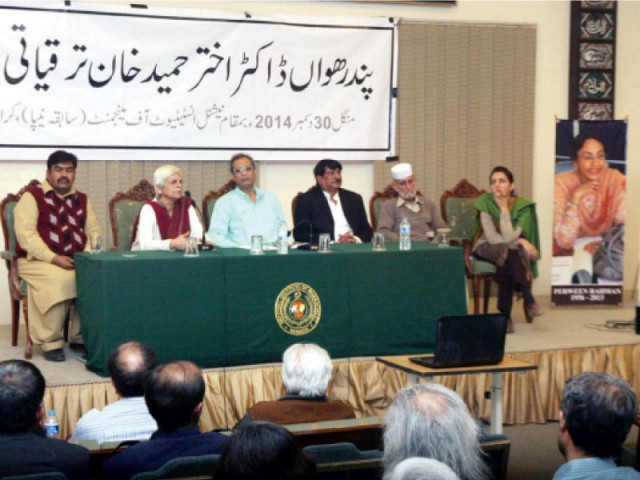Perween Rahman: Urban planner? Rights activist? Enemy to the mafia
The documentary was followed by a panel that spoke of her life and personality

Maybe someone was scared of Perween Rahman; or of her struggle for community development; or of the vision she derived from her mentor, Dr Akhtar Hameed Khan. For there was no other reason for her life to be taken away so mercilessly, lamented Faisal Siddiqi, the lawyer fighting Rahman's murder case in the Supreme Court.
Siddiqi was speaking at the 15th Dr Akhtar Hameed Khan Development Forum at the National Institute of Management auditorium on Tuesday. The annual event, organised by the Orangi Pilot Project (OPP), shed light on the personalities of Khan, the founder of OPP, and of Rahman, the slain director.
Rahman was gunned down in a drive-by shooting on March 13, 2013, in Manghopir. She sustained two bullet wounds and succumbed to her injuries on the way to Abbasi Shaheed Hospital. On the very next day, police claimed to have killed one of the assailants in an encounter. However, the motives of her murder are still unknown and the case is being tried in the Supreme Court.
"I feel Perween is still here. Smiling at me in praise," he said, pointing his hand towards the seat where she had been sitting in 2012. "It is still unbelievable that she is not among us."
The seven-hour long event was divided into two sessions, the first to discuss the Khan's life and struggle for community development and the second for the screening of a short documentary on Rahman. The documentary was followed by a panel that spoke of her life and personality.
The first speaker, Tasneem Ahmed Siddiqi, narrated the life and accomplishments of Khan, saying he was the pioneer of community development programmes in South Asia. "When Khan became the director of Pakistan Rural Academy in Comilla (now Bangladesh), he introduced the Thana Training and Development Centre (TTDC) to resolve the problems of the farmers courtesy of the poor irrigation system." The TTDC soon spread across West Pakistan aided by the then government, as Khan introduced and mobilised locals to social activism. After the fall of Dhaka, Khan migrated to Pakistan along with his family. Here he continued his community development programmes.
"He put his attention towards the dilapidated Orangi Town and started a rehabilitation project," said Arif Hasan, an urban planner and architect associated with the OPP. "The first project designed by the OPP for the town was for sanitation and it was approved by the government."
The discussion continued as organisers showed a documentary on Rahman's life. In the 20-minute film, Rahman came across as a strong, diligent person, committed in her work for people's rights. She spoke fearlessly against the land and water mafias in the city.
After the film, a panel of five speakers, including journalist Zubeida Mustafa and rights activist Rabia Ezdi, shared their experiences with Rahman. "She was a leader who showed people the way of living," said Mustafa. "She had such a charismatic personality that everyone who met her immediately became her fan." Ezdi said that the 1971 war had a profound effect on Rahman. "She used to say that she saw the worst side of humans during the migration from the West to the East part of the country."
Ezdi narrated some words that Rahman uttered three weeks before her assassination. "We were just saying amongst ourselves that if we die today, we will die happily, because we have done it."
Published in The Express Tribune, December 31st, 2014.



















COMMENTS
Comments are moderated and generally will be posted if they are on-topic and not abusive.
For more information, please see our Comments FAQ